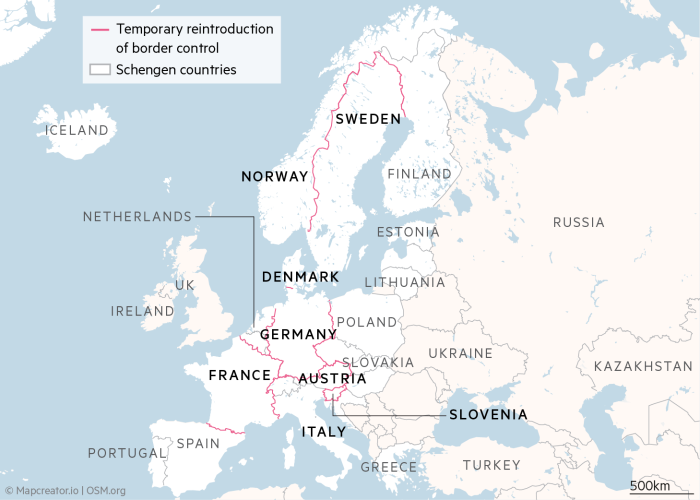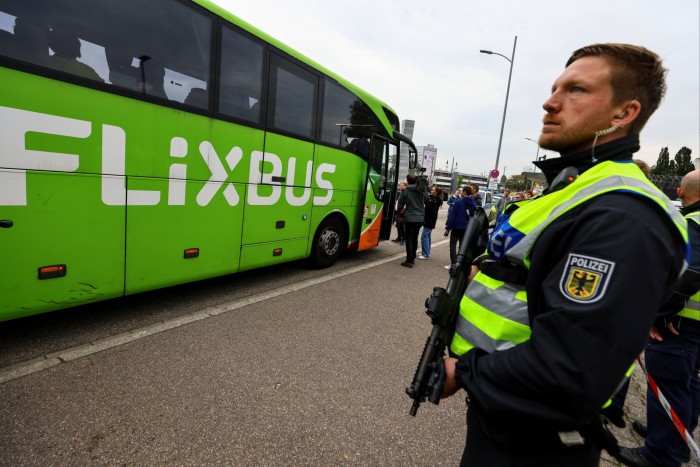
Germany’s move to impose controls on all its land borders risks setting off a domino effect that could badly weaken the Schengen system of frictionless travel, an arrangement seen as one of the EU’s greatest achievements.
Berlin imposed the checks last month as part of a bundle of law-and-order measures adopted after a suspected Isis operative from Syria stabbed three people to death in the west German city of Solingen.
France now says it will follow suit. Michel Barnier, the new French prime minister, told parliament on Tuesday that France could expand its border controls, “as permitted by European rules, and as Germany has just done”.
That is raising fears for the future of Schengen and the freedom of movement it symbolises — long regarded by EU citizens as one of the greatest accomplishments of the European project.
The concerns are particularly acute in areas close to the EU’s internal borders. Police in such places are now checking motorists who for decades crossed into Germany without a second thought to work, shop or socialise.
“The way we live our lives is now at risk,” said Uwe Conradt, mayor of Saarbrücken, on Germany’s border with France. He said the situation reminded him of the dark days of 2020 when Germany closed its border with France altogether to curb the spread of the coronavirus. “A lot of people feel this is opening up old wounds from the pandemic that were just beginning to heal,” he said.
It was in June 1985 that West Germany, France, Belgium, Luxembourg and the Netherlands signed an agreement in the small Luxembourg town of Schengen to gradually abolish checks at their common borders.
The Schengen area now consists of 25 of the EU’s 27 members as well as Iceland, Lichtenstein, Norway and Switzerland. It covers almost 4mn sq km, and a population of nearly 420mn people.
But the truth is that for years now, countries have gradually been chipping away at Schengen. At present, eight member states — Germany, Austria, Slovenia, Italy, Denmark, Sweden, France and Norway — are conducting border checks, for reasons ranging from “irregular migration”, a “risk of terrorist activity” or this summer’s Olympic Games.

Brussels says the Schengen rules can only be suspended in extraordinary circumstances. “Reintroducing border controls must remain exceptional, strictly limited in time and a measure of last resort if a serious threat to public policy or internal security has been established,” said a spokesman for the Commission.
But those conditions are not always being met in practice. “If I look at Germany, Netherlands, France or Austria, nowhere are [Brussels’] criteria being fulfilled,” said Tineke Strik, a Green member of the European parliament. “There is a big lawlessness regarding Schengen.”
The European Commission has to date not launched any infringement cases against countries reimposing controls on their frontiers. And this leniency is unlikely to change.
“I don’t see the commission tabling any infraction procedures against anyone doing what they want [on borders],” a senior EU diplomat said. “There is a tacit agreement that we have more leeway now to do this.
Germany’s move was not as dramatic as it initially seemed. It has been checking people entering from Poland, Czech Republic and Switzerland since mid-October last year, and from Austria since 2015. It also imposed temporary checks on its borders with Denmark, France and the Benelux countries during the Euro 2024 football championship last summer.
Local officials also point out that the new regime imposed on September 16 has not had much of a practical impact on the ground: there are no big traffic jams on the border, for example.
“These are smart controls,” said Benjamin Fadavian, mayor of Herzogenrath, on Germany’s frontier with the Netherlands. “It’s not like they’re putting down the barrier again and telling everyone who comes here to show their passport.”

But the potential for disruption remains massive. Some 50,000 people crossed the Dutch-German border every day in both directions, said Günter Gülker of the German-Dutch Chamber of Commerce (DNHK), as well as 100,000 lorries and trucks.
“Transport groups have told us that every hour of waiting in a queue adds €100 of additional costs for each vehicle,” he said. “The free movement of goods and people is a precious asset — so you have to very careful about how you implement these kinds of measures.”
Despite the incremental nature of the German move, it caused consternation among its neighbours. Polish Prime Minister Donald Tusk called it “unacceptable”, warning that it meant the “de facto suspension of the Schengen agreement on a large scale”.
The Greek migration minister Nikos Panagiotopoulos said individual countries should not make changes to the EU border and asylum system unilaterally. “We have to agree on this by sitting at the table and deciding as Europe,” he said last month, “because otherwise everything that’s been built so far risks being blown up”.
Some officials have conceded that border checks are not curbing irregular migration. One EU diplomat from a country currently implementing checks said that they were “more symbolic than effective”.
Still, Europe’s right-wing populists were triumphant. “In terms of fighting illegal immigration, Germany is following the example of Italy,” said Wanda Ferro, under-secretary at the Italian interior ministry. Viktor Orbán, the Hungarian leader, congratulated Olaf Scholz on X, saying “Welcome to the club!”
Such statements have triggered concerns among Schengen’s supporters that the German move on expanding controls could set a dangerous precedent. Already, officials say, other EU member states are now weighing similar measures.
“The mood has changed,” said the senior EU diplomat. “There is no taboo on talking about this any more.”
Uwe Conradt said there was now a “real danger of a domino effect”. “Germany is a big country and what we do always has an effect on others,” he said.
He saw the new controls as a painful throwback to a pre-Schengen age. Saarbrücken City Hall is just 5km from France, so “for us it’s like having a border checkpoint right in the middle of our town”.
“The question is this,” he added. “Do we want a Europe of open borders, or another kind of Europe entirely?”
Additional reporting by Leila Abboud in Paris and Henry Foy in Brussels